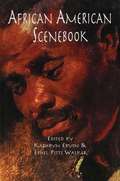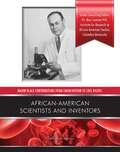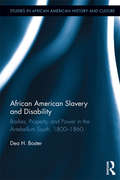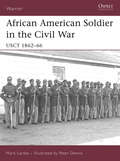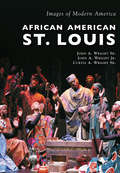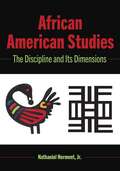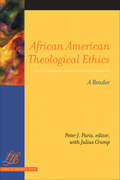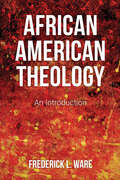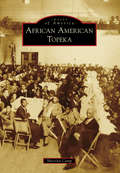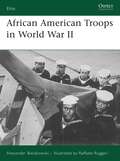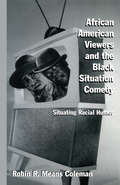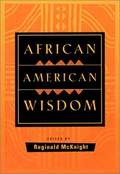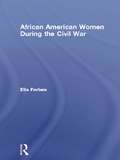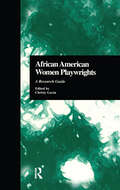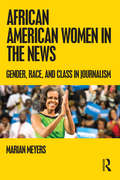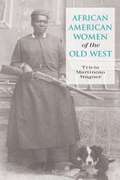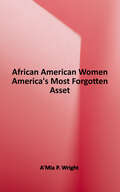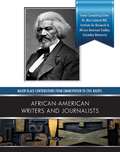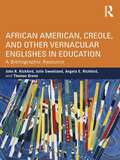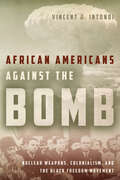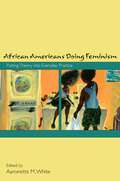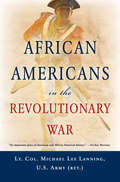- Table View
- List View
African American Scenebook (Source Books on Education #57)
by Ethel Pitts-Walker Kathryn ErvinFirst Published in 1999. Routledge is an imprint of Taylor & Francis, an informa company.
African American Scientists and Inventors (Major Black Contributions from Emancipat)
by Tish DavidsonSome of them were elementary school dropouts. Others became medical doctors or college professors. Some were famous, while some toiled in obscurity. Some became rich. Others remained poor their whole lives. But the African-American scientists and inventors profiled in this book had one thing in common: a determination to succeed. And in pursuing their dreams, these creative thinkers made the world a better place. Lewis Latimer devised a manufacturing process that made electric lights affordable for ordinary people. Charles Drew did pioneering work in blood storage, helping save countless lives. Garrett Woods figured out how to send messages from moving trains. Learn about these and many other black scientists and inventors in this fascinating book.
African American Slang
by Maciej WidawskiIn this pioneering exploration of African American slang - a highly informal vocabulary and a significant aspect of African American English - Maciej Widawski explores patterns of form, meaning, theme and function, showing it to be a rule-governed, innovative and culturally revealing vernacular. Widawski's comprehensive description is based on a large database of contextual citations from thousands of contemporary sources, including literature and the press, music, film and television. It also includes an alphabetical glossary of 1,500 representative slang expressions, defined and illustrated by 4,500 usage examples. Due to its vast size, the glossary can stand alone as a dictionary providing readers with a reliable reference of terms. Combining scholarship with user-friendliness, this book is an insightful and practical resource for students and researchers in linguistics and general readers interested in exploring lexical variation in contemporary English.
African American Slavery and Disability: Bodies, Property and Power in the Antebellum South, 1800-1860 (Studies in African American History and Culture #39)
by Dea H. BosterDisability is often mentioned in discussions of slave health, mistreatment and abuse, but constructs of how "able" and "disabled" bodies influenced the institution of slavery has gone largely overlooked. This volume uncovers a history of disability in African American slavery from the primary record, analyzing how concepts of race, disability, and power converged in the United States in the first half of the nineteenth century. Slaves with physical and mental impairments often faced unique limitations and conditions in their diagnosis, treatment, and evaluation as property. Slaves with disabilities proved a significant challenge to white authority figures, torn between the desire to categorize them as different or defective and the practical need to incorporate their "disorderly" bodies into daily life. Being physically "unfit" could sometimes allow slaves to escape the limitations of bondage and oppression, and establish a measure of self-control. Furthermore, ideas about and reactions to disability—appearing as social construction, legal definition, medical phenomenon, metaphor, or masquerade—highlighted deep struggles over bodies in bondage in antebellum America.
African American Soldier in the Civil War
by Peter Dennis Mark LardasApproximately 200,000 African Americans fought for the Union during the Civil War. Initially, many white soldiers doubted their bravery and skill; they were soon proved wrong. The United States Colored Troops performed countless acts of courage, most famously at the battle of Fort Wagner where the 54th Massachusetts marched forth and scaled the parapets, only to be driven back in fierce hand-to-hand combat. Through fascinating first-hand accounts, this title examines the journey of the African American from slave to soldier to free man, ultimately providing a fascinating insight into the impact that these brave men had on the war and how it influenced their lives thereafter.
African American St. Louis: Disappearing Black Communities (Images of Modern America)
by John A. Wright Sr. Curtis A. Wright Sr. John A. Wright Jr.The city of St. Louis is known for its African American citizens and their many contributions to the culture within its borders, the country, and the world. Images of Modern America: African American St. Louis profiles some of the events that helped shape St. Louis from the 1960s to the present. Tracing key milestones in the city's history, this book attempts to pay homage to those African Americans who sacrificed to advance fair socioeconomic conditions for all. In the closing decades of the Great Migration north, the civil rights movement was taking place nationally; simultaneously, St. Louis's African Americans were organizing to exert political power for greater control over their destiny. Protests, voter registration, and elections to public office opened new doors to the city's African Americans. It resulted in the movement for fairness in hiring practices and the expansion of the African American presence in sports, education, and entertainment.
African American Studies Kennedy-King College
by Editors at the PearsonThis book on African American studies covers topics like : Black People in Colonial North America,The Meaning of Freedom: The Promise of Reconstruction,The Failure of Reconstruction,White Supremacy Triumphant,Black Nationalism, Black Power, Black Arts etc.
African American Studies: The Discipline And Its Dimensions (Black Studies And Critical Thinking Ser. #110)
by Nathaniel NormentAfrican American Studies: The Discipline and Its Dimensions is a comprehensive resource book that recounts the development of the discipline of African American Studies and provides a basic reference source for sixteen areas of knowledge of the discipline: anthropology, art, dance, economics, education, film, history, literature, music, philosophy, psychology, religion, sociology, political science, science and technology, sports and religion. African American Studies defines bodies of knowledge, methodologies, philosophies, disciplinary concepts, contents, scope, topics scholars have concerned themselves, as well as the growth, development, and present status of the discipline. African American Studies validates that African American Studies is a unique and significant discipline—one that intersects almost every academic discipline and cultural construct—and confirms that the discipline has a noteworthy history and a challenging future. The various bodies of knowledge, the philosophical framework, methodological procedures, and theoretical underpinnings of the discipline have never been clearly delineated from an African-centered perspective.
African American Theological Ethics: A Reader
by Editor Peter J. Paris Julius CrumpThis volume in the Library of Theological Ethics series draws on writings from the early nineteenth through the late twentieth centuries to explore the intersection of black experience and Christian faith throughout the history of the United States. The first sections follow the many dimensions of the African American struggle with racism in this country: struggles against theories of white supremacy, against chattel slavery, and against racial segregation and discrimination. The latter sections turn to the black Christian vision of human flourishing, drawing on perspectives from the arts, religion, philosophy, ethics, and theology. It introduces students to major voices from African American Christianity, including Frederick Douglass, Richard Allen, W. E. B. DuBois, Marcus Garvey, Martin Luther King Jr., Bayard Rustin, Barbara Jordan, James H. Cone, and Jacqueline Grant. This is the essential resource for anyone who wishes to understand the role that Christian faith has played in the African American struggle for a more just society.
African American Theology: An Introduction
by Frederick L. WareThis book presents a substantial introduction to the major methodologies, figures, and themes within African American theology. Frederick L. Ware explores African American theology from its inception and places it within dual contexts: first, the African American struggle for dignity and full humanity; and second, the broader scope of Christian belief. Readers will appreciate Ware's demonstration of how black theology is expressed in a wide range of sources that includes not only scholarly publications but also African American sermons, music, news and editorials, biography, literature, popular periodicals, folklore, and philosophy. Each chapter concludes with questions for discussion and suggested resources for further study. Ware provides a seasoned perspective on where African American theology has been and where it is going, and he demonstrates its creativity within the chorus of Christian theology.
African American Topeka (Images of America)
by Sherrita CampAfrican Americans arrived in Topeka right before and after the Civil War and again in large numbers during the Exodus Movement of 1879 and Great Migration of 1910. They came in protest of the treatment they received in the South. The history of dissent lived on in Topeka, as it became the home to court cases protesting discrimination of all kinds. African Americans came to the city determined that education would provide them a better life. Black educators fostered a sense of duty toward schooling, and in 1954 Topeka became a landmark for African Americans across the country with the Brown vs. Topeka Board of Education case. Blacks from every walk of life found refuge in Kansas and, especially, Topeka. The images in African American Topeka have been selected to give the reader a glimpse into the heritage of black life in the community. The richness of the culture and values of this Midwestern city are a little-known secret just waiting to be exhibited.
African American Troops in World War II
by Raffaele Ruggeri Alexander BielakowskiOsprey's study of the African Americans' involvement in World War II (1939-1945). Despite the contribution of black units to the American Expeditionary Force in World War I (1914-1918), and the commissioning of hundreds of black officers to lead them, the small interwar US Army continued to regard them as unsuited to both leadership roles and handling modern technology. Although African Americans had to strive against prejudice for every chance to show what they could achieve, in fact the wartime US Army conceded opportunities for leadership unparaleled in American civil society at that date. In World War II tens of thousands served in segregated units. While the majority were denied the opportunity of combat, a minority of all-black, black-officered units proved their worth in all theaters and a number of roles: black officer fighter pilots (the "Tuskegee Airmen") blazed the trail, followed by several tank and tank-destroyer battalions and a few field artillery units; and more than 20,000 black infantrymen served under both white and black officers. The Army also created the first fully integrated units, whose success prompted President Truman to order the complete integration of the military in 1948. The US Navy and Marines were slower to allow blacks to serve in combat roles and to commission black officers, but by 1945 two complete ships' companies were composed of African-Americans (though with white officers).
African American Viewers and the Black Situation Comedy: Situating Racial Humor (Studies in African American History and Culture)
by Robin R. Means ColemanProviding new insight into key debates over race and representation in the media, this ethnographic study explores the ways in which African Americans have been depicted in Black situation comedies-from 1950's Beulah to contemporary series like Martin and Living Single.
African American Voices: The Life Cycle of Slavery
by Steven Mintz<p>The 58 selections in this volume cover the history of slavery in America, moving from memories of growing up in Africa to the trials of the Middle Passage, the horrors of the auction block, the sustaining forces of family and religions, acts of resistance, and the meaning of the Civil War and emancipation, presenting 300 years in the collective life cycle of an enslaved people. <p>Mintz's extensive introduction is followed by substantial excerpts from published slave narratives, interviews with former slaves, and letters written by enslaved African Americans. The end of the volume includes a bibliographic essay and a 40-page bibliography, making this an indispensible book for the study of slavery.</p>
African American Wisdom (revised and expanded edition)
by Reginald Mcknight"A new broom sweep clean, but an old brush knows the corners." --Anonymous There's a time when you have to explain to your children why they're born, and it's a marvelous thing if you know the reason by then. --HAZEL SCOTT Love, I find is like singing. Everybody can do enough to satisfy themselves, though it may not impress the neighbors as being very much. --ZORA NEALE HURSTON This is a wonderful collection!
African American Women During the Civil War (Studies in African American History and Culture)
by Ella ForbesThis study uses an abundance of primary sources to restore African American female participants in the Civil War to history by documenting their presence, contributions and experience. Free and enslaved African American women took part in this process in a variety of ways, including black female charity and benevolence. These women were spies, soldiers, scouts, nurses, cooks, seamstresses, laundresses, recruiters, relief workers, organizers, teachers, activists and survivors. They carried the honor of the race on their shoulders, insisting on their right to be treated as "ladies" and knowing that their conduct was a direct reflection on the African American community as a whole.For too long, black women have been rendered invisible in traditional Civil War history and marginal in African American chronicles. This book addresses this lack by reclaiming and resurrecting the role of African American females, individually and collectively, during the Civil War. It brings their contributions, in the words of a Civil War participant, Susie King Taylor, "in history before the people."
African American Women Playwrights: A Research Guide (Critical Studies in Black Life and Culture #31)
by Christy GavinFirst Published in 1999. Routledge is an imprint of Taylor & Francis, an informa company.
African American Women in the News: Gender, Race, and Class in Journalism
by Marian MeyersAfrican American Women in the News offers the first in-depth examination of the varied representations of Black women in American journalism, from analyses of coverage of domestic abuse and "crack mothers" to exploration of new media coverage of Michelle Obama on Youtube. Marian Meyers interrogates the complex and often contradictory images of African American women in news media through detailed studies of national and local news, the mainstream and Black press, and traditional news outlets as well as newer digital platforms. She argues that previous studies of African Americans and the news have largely ignored the representations of women as distinct from men, and the ways in which socioeconomic class can be a determining factor in how Black women are portrayed in the news. Meyers also proposes that a pattern of paternalistic racism, as distinct from the "modern" racism found in previous studies of news coverage of African Americans, is more likely to characterize the media's treatment of African American women. Drawing on critical cultural studies and black feminist theory concerning representation and the intersectionality of gender, race and class, Meyers goes beyond the cultural myths and stereotypes of African American women to provide an updated portrayal of Black women today. African American Women in the News is ideal for courses on African American studies, American studies, journalism studies, media studies, sociology studies, women’s studies and for professional journalists and students of journalism who seek to improve the diversity and sensitivity of their journalistic practice.
African American Women of the Old West
by Tricia Martineau WagnerThe brave pioneers who made a life on the frontier were not only male; and they were not only white. The story of African-American women in the Old West is one that has largely gone untold--until now. The story of ten African-American women is reconstructed from historic documents found in century-old archives. The ten remarkable women in Black Women of the Old West were all born before 1900, some were slaves, some were free, and some lived both ways during their lifetime. Among them were laundresses, freedom advocates, journalists, educators, midwives, business proprietors, religious converts, philanthropists, mail and freight haulers, and civil and social activists.
African American Women: America's Most Forgotten Asset
by A'Mia P. WrightWithin this book, the author aimed to restore, rehabilitate, and mend African-American Women and the community. The entire world has acknowledged the issues African Americans face as a culture, however, no one has advanced toward assimilating relationships within the culture. As resilient of a people as African Americans are the culture still need a leader, still need guidance, and still need reassurance. It is believed that African-American Women are the key to turning everything around and remodeling the foundation that was once laid. The potency of African-American Women is so prodigious that it has the power of an atomic bomb. Today's leaders for African Americans are outnumbered and rejected because in the community today, stupidity reigns over knowledge and foolishness is the new cute.
African American Writers and Journalists (Major Black Contributions from Emancipat)
by Mary Hertz ScarbroughAfrican-American Writers and Journalists spans nearly three centuries of literary and journalistic history, from a long-unpublished ballad composed in the 1740s by a slave named Lucy Terry to the works of the Nobel Prize-winning novelist Toni Morrison. It tells the stories of figures such as Frederick Douglass, whose towering intellect and powerful prose helped animate the movement to abolish slavery; Ida B. Wells and Charlotta Bass, journalists who risked their lives to report on racial violence and injustice; and Ralph Ellison and Richard Wright, who challenged society with hard questions about race and equality.
African American, Creole, and Other Vernacular Englishes in Education: A Bibliographic Resource (NCTE-Routledge Research Series)
by John R. Rickford Julie Sweetland Angela E. Rickford Thomas GranoMore than 50 years of scholarly attention to the intersection of language and education have resulted in a rich body of literature on the role of vernacular language varieties in the classroom. This field of work can be bewildering in its size and variety, drawing as it does on the diverse methods, theories, and research paradigms of fields such as sociolinguistics, applied linguistics, psychology, and education. Compiling most of the publications from the past half century that deal with this critical topic, this volume includes more than 1600 references (books, articles in journals or books, and web-accessible dissertations and other works) on education in relation to African American Vernacular English [AAVE], English-based pidgins and creoles, Latina/o English, Native American English, and other English vernaculars such as Appalachian English in the United States and Aboriginal English in Australia), with accompanying abstracts for approximately a third of them. This comprehensive bibliography provides a tool useful for those interested in the complex issue of how knowledge about language variation can be used to more effectively teach students who speak a nonstandard or stigmatized language variety.
African Americans Against the Bomb: Nuclear Weapons, Colonialism, and the Black Freedom Movement
by Vincent J. IntondiWell before Rev. Dr. Martin Luther King, Jr. spoke out against nuclear weapons, African Americans were protesting the Bomb. Historians have generally ignored African Americans when studying the anti-nuclear movement, yet they were some of the first citizens to protest Truman's decision to drop atomic bombs in Hiroshima and Nagasaki in 1945. Now for the first time, African Americans Against the Bomb tells the compelling story of those black activists who fought for nuclear disarmament by connecting the nuclear issue with the fight for racial equality. Intondi shows that from early on, blacks in America saw the use of atomic bombs as a racial issue, asking why such enormous resources were being spent building nuclear arms instead of being used to improve impoverished communities. Black activists' fears that race played a role in the decision to deploy atomic bombs only increased when the U.S. threatened to use nuclear weapons in Korea in the 1950s and Vietnam a decade later. For black leftists in Popular Front groups, the nuclear issue was connected to colonialism: the U.S. obtained uranium from the Belgian controlled Congo and the French tested their nuclear weapons in the Sahara. By expanding traditional research in the history of the nuclear disarmament movement to look at black liberals, clergy, artists, musicians, and civil rights leaders, Intondi reveals the links between the black freedom movement in America and issues of global peace. From Langston Hughes through Lorraine Hansberry to President Obama, African Americans Against the Bomb offers an eye-opening account of the continuous involvement of African Americans who recognized that the rise of nuclear weapons was a threat to the civil rights of all people.
African Americans Doing Feminism: Putting Theory into Everyday Practice
by Aaronette M. WhiteHow might ordinary people apply feminist principles to everyday situations? How do feminist ideas affect the daily behaviors and decisions of those who seek to live out the basic idea that women are as fully human as men? This collection of essays uses concrete examples to illuminate the ways in which African Americans practice feminism on a day-to-day basis. Demonstrating real-life situations of feminism in action, each essay tackles an issue—such as personal finances, parenting, sexual harassment, reproductive freedom, incest, depression and addiction, or romantic relationships—and articulates a feminist approach to engaging with the problem or concern. Contributors include African American scholars, artists, activists, and business professionals who offer personal accunts of how they encountered feminist ideas and are using them now as a guide to living. The essays included reveal how feminist principles affect people's perceptions of their ability to change themselves and society, because the personal is not always self-evidently political.
African Americans In The Revolutionary War
by Lt. Col. Lanning&“A thorough, long-overdue study of Black Americans&’ contributions during the War of Independence. . . . An important piece of American and African American history.&”—Kirkus Reviews In this enlightening and informative work, military historian Lt. Col. Michael Lee Lanning (ret.) reveals the little-known, critical, and heroic role African Americans played in the American Revolution, serving in integrated units—a situation that would not exist again until the Korean War—more than 150 years later . . . At first, neither George Washington nor the Continental Congress approved of enlisting African Americans in the new army. Nevertheless, Black men—both slave and free—filled the ranks and served in all of the early battles. Black sailors also saw action in every major naval battle of the Revolution, including members of John Paul Jones&’s crew aboard the Bonhomme Richard. At least thirteen Black Americans served in the newly formed U.S. Marine Corps during the war. Bravery among African Americans was commonplace, as recognized by their commanders and state governments, and their bravery is recorded here in the stories of citizen Crispus Attucks at the Boston Massacre; militiaman Price Esterbrook at Lexington Green; soldier Salem Poor at Bunker Hill; and marine John Martin aboard the brig Reprisal. As interest in colonial history enjoys renewed popularity due to works like Hamilton, and the issues of prejudice and discrimination remain at the forefront of our times, African Americans in the Revolutionary War offers an invaluable perspective on a crucial topic that touches the lives of Americans of every color and background.
